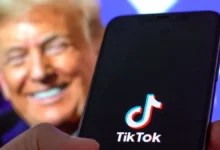
As a deal deadline of April 5 approaches, U.S. officials and major U.S. tech companies are intensifying efforts to conclude an agreement for a sale of TikTok’s U.S. operations. The high-stakes negotiations, which have included potential buyers such as Microsoft, Google and Andreessen Horowitz, center on the app’s future as national security concerns, data privacy issues and geopolitical rifts mount.
Why the U.S. Sale of TikTok Matters
The forthcoming U.S. sale, however, is not simply a sale. At this point, it could also represent another stage of the increasing tensions in diplomacy between the U.S. and China. The very nature of Chinese ownership of TikTok has raised suspicions in certain quarters of the US government regarding the use of the app for surveillance or influence operations. By April 5, the U.S. government has threatened the app with an outright prohibition unless ByteDance, its Chinese parent company, divests its American operations to non-Chinese interests. This created a mad scramble with all the big players trying to come in.
Tech Giants Step In: Microsoft, Google, and Cloud Solutions
Cloud computing has become a hot topic. TikTok’s backbone rests on heavy clouds; it needs the likes of Microsoft and Google to continue operating on U.S. soil. And those two are reportedly discussing provisions for cloud service that stores and secures vast amounts of user data without exposure to national security risks.
Of course, Microsoft and Google cloud will be an integral part of any discussions, but their participation might be an eye to a more serious involvement with the widely-respected app. Both the software companies want to expand their cloud footprint and bolstering their position in the highly competitive cloud service sector through TikTok’s data secrecy.
However, we don’t know the terms or technicalities of these cloud service contracts. For example, how exactly will some of the data be compartmentalized, and what kind of oversight will the U.S. government have over this? Getting to know the intricacies of such arrangements could shed light on how these giants plan to secure operations for Tiktok about national security.
Political Tensions and National Security Concerns
The deal is more than just a business deal; it is enmeshed in the broader U.S.-China political landscape. The Trump administration’s push to divest TikTok from ByteDance would reduce Chinese influence over whatever operations the app had in the U.S., but the sale could have far-reaching ramifications. Should the sale be completed, it could set precedents for how U.S. companies operate in the country along with foreign-owned apps. That scenario may escalate tension with China over trade, embroiling the issue ever more deeply in the geopolitical landscape.
Oracle, perhaps the most important of bidders, would assure U.S. data on TikTok were held, but it remains uncertain that this arrangement would eliminate national security concerns from the table in Washington. The Chinese government has been very adamant about the importance of the algorithm to TikTok; that remains a big point of contention. Would ByteDance retain control over the algorithm, or is it going to be passed down to the U.S. stakeholders?
These political dynamics add urgency to the deal. The April 5 deadline represents more than just the finalization of the deal; it is a critical turning point in the ongoing U.S.-China tensions and data sovereignty debates.
Andreessen Horowitz and the Financial Backing
Andreessen Horowitz, a giant Silicon Valley venture capital firm with a history of savvy investments in big tech, including Facebook and Twitter, is another key player in the negotiations. Andreessen’s participation in the deal highlights the robust financial support for the TikTok U.S. sale, adding additional muscle to a competitive auction. Andreessen Horowitz is potentially looking at a larger stake in TikTok and Blackstone Group is in talks about a smaller investment, according to reports.
But Andreessen’s links to the Trump administration raise concerns about the extent to which political agendas are driving the deal. His firm has already assisted in recruiting staff for the U.S. government’s cost-cutting unit, and his deep ties to Elon Musk underscore the amorphous lines between tech investment and political influence. It remains to be seen whether this backing is seen as a positive or as a possible conflict of interest.
What’s at Stake for TikTok Users and Employees?
The headlines have been filled with business and political angles, but the fate of TikTok’s millions of American users and employees is just as meaningful. If ownership of the app changes, what happens to the user experience of that app? How will content moderation and data privacy policies change in new hands?
Users could feel changes in the way their data is handled, and employees could see changes in corporate culture. How the sale plays out for TikTok’s day-to-day operations will be important for gauging whether the app can hold on to its massive user base in the U.S., including sensitive younger audiences more attuned to privacy issues.
A Time-Sensitive Deal
The stakes are as high as never before- Microsoft, Google, and Andreessen Horowitz must finalize the deal before the April 5th deadline. If the sale fails, TikTok may soon get forced out of the U.S. market, breaking millions of users and billions of revenues. Expect the broader tech landscape to feel the ramifications because the deal could very effectively shape future data security regulations and international business contracts.
Conclusion: A Complex Negotiation with High Stakes
The entangled TikTok U.S. sale explores business interests, national security, and geopolitical aspects of the deal. The cloud titans-Microsoft, Google, and the venture capitalist Andreessen Horowitz-having been interested together with the Trump Administration pressure for a non-Chinese owner will definitely alter tech for years ahead. Either way, the fate of this deal-TikTok or not-will have implications felt throughout a larger tech ecosystem and beyond for many months and years to come.
Follow us on WhatsApp, Telegram, Twitter, and Facebook, or subscribe to our weekly newsletter to ensure you don’t miss out on any future updates. Send tips to editorial@techtrendsmedia.co.ke



